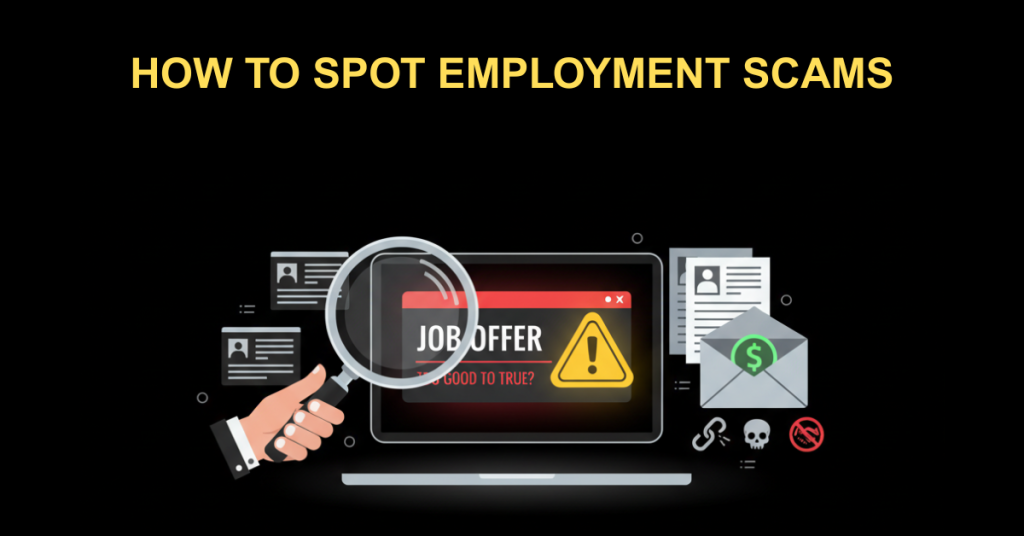You’ve just lost your job—or maybe you’re seeking new opportunities. Then, ding! A message: “High-paying remote job, easy hours, apply now!” Tempting, right? But this is exactly the kind of bait scammers are using to reel in hopeful job seekers.
The Growing Threat of Employment Scams
Employment scams continue to rise worldwide, driven by digital recruitment and post-pandemic shifts. According to the U.S. Federal Trade Commission (FTC), over 105,000 employment scam reports were filed in 2024, with losses exceeding $450 million, marking a 23% increase from 2023. Similar trends are reported by Europol and the UK’s Action Fraud.
| Year | US Employment Scam Reports | Estimated Losses (USD) |
| 2022 | 76,000 | $250 million |
| 2023 | 85,000 | $365 million |
| 2024 | 105,000 | $450 million |
In the era of remote hiring, digital applications, and social media networking, scammers have more tools than ever to appear convincing.
Spot the Red Flags Before It’s Too Late
Here’s how savvy job seekers can avoid taking the bait:
1. Offers That Drop from the Sky
Getting a job offer without applying, interviewing, or even talking to a person? That’s a red flag. Real recruiters don’t operate that way.
2. Upfront Payments or Equipment Purchases
Legitimate employers don’t ask you to pay for training, onboarding kits, or work permits. If they do—that’s someone taking advantage of your desperation.
3. Vague Descriptions and Over-the-Top Salaries
Promises of “$200–500 per day, no experience needed” should trigger skepticism. When job details are fuzzy or the pay sounds too good compared to industry standards—that’s a scam sign.
4. Unprofessional Communication
Beware of unsolicited emails or texts from generic addresses, poorly written messages, or requests to communicate over WhatsApp instead of official channels.
5. Requests for Sensitive Information Early On
Avoid providing your Social Security Number, bank info, or photo ID before a legitimate offer is issued—if you even get one.
6. Fake Job Titles and Urgency
Scammers often impersonate major companies (like Tesla or Indeed) and inject a sense of urgency: “Only three openings left!” or “Respond now!” – tactics to rush you into mistakes.
7. Fake Check Traps
One classic trick: You get a check for a “sign-on bonus,” deposit it, and send some money back. Days later, the bank flags it as fake—and you’re on the hook.
How to Protect Yourself from Employment Scams?
Multi-Layered Verification
Cross-check company and recruiter identities via multiple sources:
- Company and Position Verification
- Business Database and Registration Verification
- Employee Reviews and Social Media Validation
- Position Description Reasonableness
- Qualification and Salary Alignment
Leveraging Professional Networks and Resources
Use trusted referrals and official job boards like LinkedIn Jobs and Indeed.
Technology Tools and Apps
- RealCall: Blocks scam calls and flags suspicious numbers.
- Have I Been Pwned: Checks if your data has been compromised.
Personal Security Habits
- Avoid rushing into offers
- Protect personal info and stay alert
Reporting Channels
- FTC Complaint Assistant
- Action Fraud UK
- Company HR or IT security teams
Use Technology for Backup
Apps like RealCall can help block scam calls from fake recruiters, keeping your phone safe from fraudsters.
Trust Your Gut—and Double-Check Everything
Always take a pause. Verify the company directly, inspect email domains, look for postings on official career pages, and ask trusted friends for feedback.
When in doubt, don’t respond. This isn’t just about saving money—it’s about protecting your identity, your career, and your peace of mind.
RealCall as Part of Your Digital Security Toolkit
RealCall is a powerful tool to filter suspicious calls and reduce scam risks, but users must remain vigilant and use multiple strategies.
Future-Proofing Your Job Search
- Use trusted platforms and networks
- Develop critical verification skills
- Maintain a cautious, informed approach
By combining awareness, verification, and tools like RealCall, you can navigate the 2025 job market safely and confidently, minimizing the risk of employment scams.

